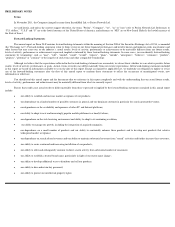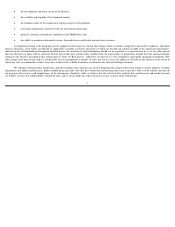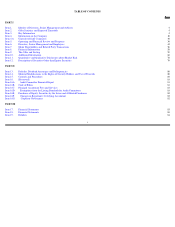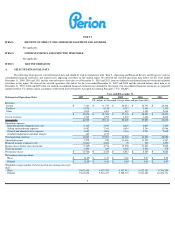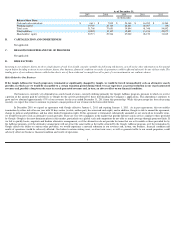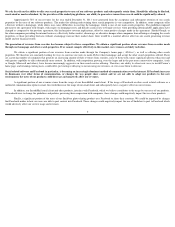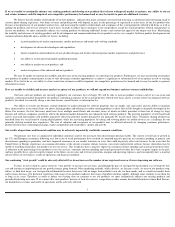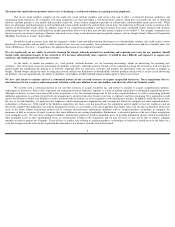Incredimail 2011 Annual Report Download - page 14
Download and view the complete annual report
Please find page 14 of the 2011 Incredimail annual report below. You can navigate through the pages in the report by either clicking on the pages listed below, or by using the keyword search tool below to find specific information within the annual report.
If the ubiquity of Adobe’
s flash technology decreases, the use of our Smilebox photo sharing product could be negatively affected and as a result our
revenues could decline.
Our Smilebox photo sharing product for the desktop uses Adobe Flash technology as part of its core underlying file format and relies on the fact that
recipients in general have Flash and are able to playback Smilebox creations without requiring an additional file download. We could be adversely impacted by a
reduction in the marketing of Flash by Adobe and a related decline in the ubiquity of Flash as a platform.
Exchange rate fluctuations may decrease our earnings if we are not able to hedge our currency exchange risks effectively.
A majority of our revenues are denominated in U.S. dollars. However, a significant portion of our sales is in currencies other than the U.S. dollar, of which a
large portion is in, or originates in, Euros. In 2011, approximately 16% of our revenue was received directly in these currencies and approximately an additional 69%
indirectly originated in these currencies. To the extent such sales are not immediately exchanged for U.S. dollars, we bear a foreign currency fluctuation risk. In
addition, a substantial part of our costs, mainly personnel expenses, are incurred in NIS. Inflation in Israel may have the effect of increasing the U.S. dollar cost of our
operations in Israel. Whenever the U.S. dollar declines in value in relation to the New Israeli Shekel, it will become more expensive for us to fund our operations in
Israel. A revaluation of one percent of the NIS as compared to the U.S. dollar could reduce our income before taxes by approximately $0.1 million. The exchange rate
of the U.S. dollar to the New Israeli Shekel has been very volatile in the past years, increasing on average through the year,
by approximately 10% in 2009, decreasing
by 5% in 2010 and decreasing by approximately 4% in 2011. As of December 31, 2011, we had a foreign currency net asset of approximately $6 million and our total
foreign exchange income was approximately $102 thousand for the year ended December 31, 2011. In addition, in market territories where our prices are based on
local currencies, fluctuations in the dollar exchange rate could affect our gross profit margin. To assist us in hedging the risks associated with
fluctuations in currency
exchange rates, we have contracted a consulting firm proficient in this area, and are generally implementing their proposals. Based on the advice received from this
firm, we are advised that we are unable to hedge exchange risks associated with revenues indirectly originating in non-
U.S. dollar currencies, but received in US
dollars. We do not hedge the exchange risk from revenues received directly in non-
US currencies, as the amounts of these revenues are not material. However, due to
the market conditions, volatility and other factors, we do not always implement our consultant’s proposals in full, our consultant’
s proposals do not always prove to be
effective and may even prove harmful. We may incur losses from unfavorable fluctuations in foreign currency exchange rates. See "Item 11 Quantitative and
Qualitative Disclosure of Market Risks" for further discussion of the effects of exchange rate fluctuations on earnings.
A loss of the services of our senior management and other key personnel could adversely affect execution of our business strategy.
We depend on the continued services of our senior management, particularly Josef Mandelbaum, our Chief Executive Officer. Our current strategy is to a
great extent a function of his capabilities and experience, together with the experience and knowledge of our other senior management. The loss of the services of
these personnel could create a gap in management and could result in the loss of management and technical expertise necessary for us to execute our business strategy
and thereby adversely affect execution of our business strategy. We do not currently have "key person" life insurance with respect to any of our senior management.
Further, our ability to execute our business strategy also depends on our ability to continue to attract, retain and motivate qualified and skilled technical and
creative personnel and skilled management, marketing and sales personnel. If we cannot attract and retain additional key employees or lose one or more of our current
key employees, our ability to develop or market our products and attract or acquire new users could be adversely affected. See "Item 6 Directors, Senior Management
and Employees."
Under current Israeli law, we may not be able to enforce non-
competition covenants and, therefore, may be unable to prevent our competitors from
benefiting from the expertise of some of our former employees.
We have entered into non-
competition agreements with most of our professional employees. These agreements prohibit our employees, if they cease working
for us, from competing directly with us or working for our competitors for a limited period. Under current Israeli law, we may be unable to enforce these agreements,
in whole or in part, and it may be difficult for us to restrict our competitors from gaining the expertise that our former employees gained while working for us. For
example, Israeli courts have required employers seeking to enforce non-
compete undertakings of a former employee to demonstrate that the competitive activities of
the former employee will harm one of a limited number of material interests of the employer which have been recognized by the courts, such as the secrecy of a
company’
s confidential commercial information or its intellectual property. If we cannot demonstrate that harm would be caused to us, we may be unable to prevent
our competitors from benefiting from the expertise of our former employees.
11


